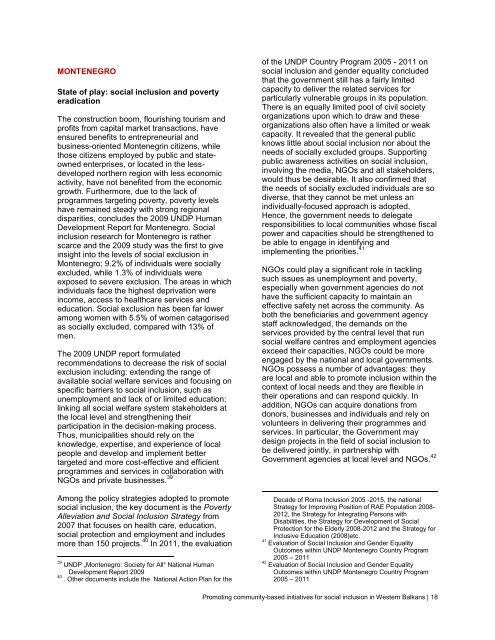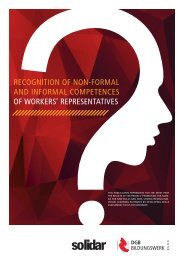Promoting community-based initiatives for social inclusion ... - Solidar
Promoting community-based initiatives for social inclusion ... - Solidar
Promoting community-based initiatives for social inclusion ... - Solidar
You also want an ePaper? Increase the reach of your titles
YUMPU automatically turns print PDFs into web optimized ePapers that Google loves.
MONTENEGRO<br />
State of play: <strong>social</strong> <strong>inclusion</strong> and poverty<br />
eradication<br />
The construction boom, flourishing tourism and<br />
profits from capital market transactions, have<br />
ensured benefits to entrepreneurial and<br />
business-oriented Montenegrin citizens, while<br />
those citizens employed by public and stateowned<br />
enterprises, or located in the lessdeveloped<br />
northern region with less economic<br />
activity, have not benefited from the economic<br />
growth. Furthermore, due to the lack of<br />
programmes targeting poverty, poverty levels<br />
have remained steady with strong regional<br />
disparities, concludes the 2009 UNDP Human<br />
Development Report <strong>for</strong> Montenegro. Social<br />
<strong>inclusion</strong> research <strong>for</strong> Montenegro is rather<br />
scarce and the 2009 study was the first to give<br />
insight into the levels of <strong>social</strong> exclusion in<br />
Montenegro; 9.2% of individuals were <strong>social</strong>ly<br />
excluded, while 1.3% of individuals were<br />
exposed to severe exclusion. The areas in which<br />
individuals face the highest deprivation were<br />
income, access to healthcare services and<br />
education. Social exclusion has been far lower<br />
among women with 5.5% of women catagorised<br />
as <strong>social</strong>ly excluded, compared with 13% of<br />
men.<br />
The 2009 UNDP report <strong>for</strong>mulated<br />
recommendations to decrease the risk of <strong>social</strong><br />
exclusion including: extending the range of<br />
available <strong>social</strong> welfare services and focusing on<br />
specific barriers to <strong>social</strong> <strong>inclusion</strong>, such as<br />
unemployment and lack of or limited education;<br />
linking all <strong>social</strong> welfare system stakeholders at<br />
the local level and strengthening their<br />
participation in the decision-making process.<br />
Thus, municipalities should rely on the<br />
knowledge, expertise, and experience of local<br />
people and develop and implement better<br />
targeted and more cost-effective and efficient<br />
programmes and services in collaboration with<br />
NGOs and private businesses. 39<br />
Among the policy strategies adopted to promote<br />
<strong>social</strong> <strong>inclusion</strong>, the key document is the Poverty<br />
Alleviation and Social Inclusion Strategy from<br />
2007 that focuses on health care, education,<br />
<strong>social</strong> protection and employment and includes<br />
more than 150 projects. 40 In 2011, the evaluation<br />
39 UNDP „Montenegro: Society <strong>for</strong> All“ National Human<br />
Development Report 2009<br />
40 . Other documents include the National Action Plan <strong>for</strong> the<br />
of the UNDP Country Program 2005 - 2011 on<br />
<strong>social</strong> <strong>inclusion</strong> and gender equality concluded<br />
that the government still has a fairly limited<br />
capacity to deliver the related services <strong>for</strong><br />
particularly vulnerable groups in its population.<br />
There is an equally limited pool of civil society<br />
organizations upon which to draw and these<br />
organizations also often have a limited or weak<br />
capacity. It revealed that the general public<br />
knows little about <strong>social</strong> <strong>inclusion</strong> nor about the<br />
needs of <strong>social</strong>ly excluded groups. Supporting<br />
public awareness activities on <strong>social</strong> <strong>inclusion</strong>,<br />
involving the media, NGOs and all stakeholders,<br />
would thus be desirable. It also confirmed that<br />
the needs of <strong>social</strong>ly excluded individuals are so<br />
diverse, that they cannot be met unless an<br />
individually-focused approach is adopted.<br />
Hence, the government needs to delegate<br />
responsibilities to local communities whose fiscal<br />
power and capacities should be strengthened to<br />
be able to engage in identifying and<br />
implementing the priorities. 41<br />
NGOs could play a significant role in tackling<br />
such issues as unemployment and poverty,<br />
especially when government agencies do not<br />
have the sufficient capacity to maintain an<br />
effective safety net across the <strong>community</strong>. As<br />
both the beneficiaries and government agency<br />
staff acknowledged, the demands on the<br />
services provided by the central level that run<br />
<strong>social</strong> welfare centres and employment agencies<br />
exceed their capacities, NGOs could be more<br />
engaged by the national and local governments.<br />
NGOs possess a number of advantages: they<br />
are local and able to promote <strong>inclusion</strong> within the<br />
context of local needs and they are flexible in<br />
their operations and can respond quickly. In<br />
addition, NGOs can acquire donations from<br />
donors, businesses and individuals and rely on<br />
volunteers in delivering their programmes and<br />
services. In particular, the Government may<br />
design projects in the field of <strong>social</strong> <strong>inclusion</strong> to<br />
be delivered jointly, in partnership with<br />
Government agencies at local level and NGOs. 42<br />
Decade of Roma Inclusion 2005 -2015, the national<br />
Strategy <strong>for</strong> Improving Position of RAE Population 2008-<br />
2012, the Strategy <strong>for</strong> Integrating Persons with<br />
Disabilities, the Strategy <strong>for</strong> Development of Social<br />
Protection <strong>for</strong> the Elderly 2008-2012 and the Strategy <strong>for</strong><br />
Inclusive Education (2008)etc.<br />
41 Evaluation of Social Inclusion and Gender Equality<br />
Outcomes within UNDP Montenegro Country Program<br />
2005 – 2011<br />
42 Evaluation of Social Inclusion and Gender Equality<br />
Outcomes within UNDP Montenegro Country Program<br />
2005 – 2011<br />
<strong>Promoting</strong> <strong>community</strong>-<strong>based</strong> <strong>initiatives</strong> <strong>for</strong> <strong>social</strong> <strong>inclusion</strong> in Western Balkans | 18
















